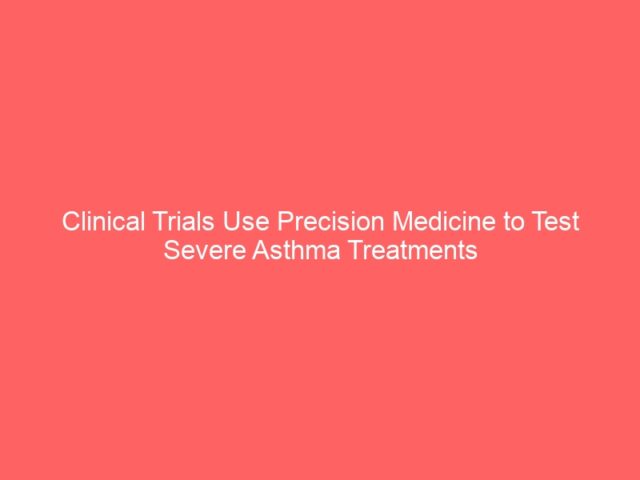Researchers at Ann & Robert H. Lurie Kids’s Hospital of Chicago are working to differentiate bronchial asthma illness sorts and match remedies to the affected person’s bronchial asthma kind.
RT’s Three Key Takeaways:
- Precision drugs strategy: Researchers used biomarker-driven methods within the PrecISE trial to tailor bronchial asthma remedies to particular person inflammatory profiles, transferring past a one-size-fits-all mannequin.
- Biomarker-guided therapies: Adolescents with excessive nitric oxide or eosinophil ranges had been matched to focused remedies (MCT or broncho-vaxom), aiming to enhance outcomes by aligning remedy with airway irritation kind.
- Future affect: This platform trial marks a serious step towards personalised bronchial asthma care and will result in simpler, inflammation-specific remedies throughout numerous bronchial asthma subtypes.
Bronchial asthma severity may be affected by a number of inflammatory pathways, which make it difficult to deal with with a “one dimension suits all” strategy. This is the reason researchers began pursuing precision drugs for bronchial asthma – distinguishing illness sorts primarily based on particular organic indicators (known as biomarkers) and matching remedies to the affected person’s bronchial asthma kind.
“With a trial that makes use of precision drugs as a method to direct topics to the doubtless most optimum remedy for his or her kind of profile, we are trying to use to bronchial asthma an strategy that proved profitable with most cancers research. That is known as a platform trial the place a number of interventions are examined in topics who take part within the trial. That is notably necessary since bronchial asthma that’s extreme and related to danger of exacerbations is variable within the varieties of irritation current and desires extra exact choices for remedy,” mentioned Rajesh Kumar, MD, Interim Division Head of Allergy and Immunology at Ann & Robert H. Lurie Kids’s Hospital of Chicago and Professor of Pediatrics at Northwestern College Feinberg Faculty of Medication. “That is an thrilling first for bronchial asthma analysis.”
Dr. Kumar is the Lurie Kids’s web site Principal Investigator for the Precision Interventions for Extreme and/or Exacerbation-Inclined Bronchial asthma (PrecISE) Community, a groundbreaking collaborative of bronchial asthma researchers from throughout the USA. He is also on the Steering Committee, the Publications Committee and the New Approaches Committee of the PrecISE Community.
“Within the PrecISE research we checked out six totally different remedies general, however in adolescents we restricted these to solely two remedies with the perfect security profile in youngsters – a dietary complement known as MCT (medium-chain triglycerides) or an immune modulating combination of bacterial breakdown merchandise (known as broncho-vaxom). Within the topics who had been included at Lurie Kids’s, we evaluated two immunomodulatory remedies towards a placebo. The remedy that was chosen first was primarily based on biomarkers related to bronchial asthma,” mentioned Dr. Kumar. “Topics had the choice to proceed to the subsequent remedy interval sequentially to check the second drug, in an effort to see if the biomarker predicted remedy response.”
Quite a few biomarkers had been included, however key biomarkers that had been anticipated to extend the probabilities of response had been used to extend the chance {that a} participant could be scheduled and randomized to check every remedy.
Nitric oxide, which is a gasoline produced as a part of the allergic irritation within the airways, was the biomarker that elevated the chance that an adolescent could be positioned on MCT.
Adolescents with excessive ranges of eosinophils –a kind of white blood cells which might be concerned within the immune response and contribute to irritation in allergic bronchial asthma –had been extra prone to be first included within the arm of the research testing bronco-vaxom.
The research accomplished the scientific part and is now present process knowledge evaluation.
“We hope that this research will promote additional precision drugs research that rework bronchial asthma care,” mentioned Dr. Kumar. “In the end, we hope to have the ability to characterize a affected person’s bronchial asthma primarily based on biomarkers and choose a remedy that’s simplest for that bronchial asthma kind throughout a number of varieties of bronchial asthma, not simply allergic bronchial asthma.”













